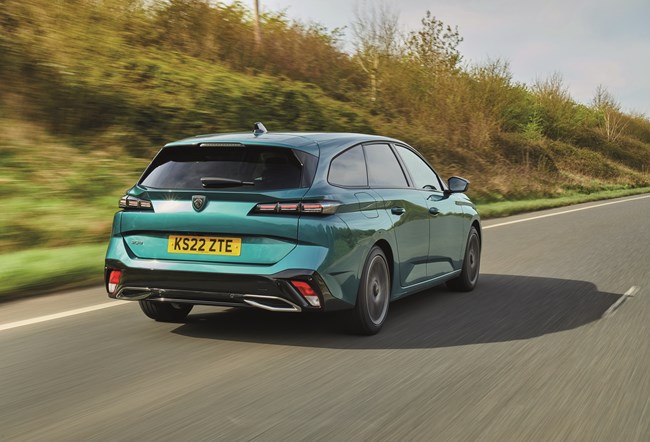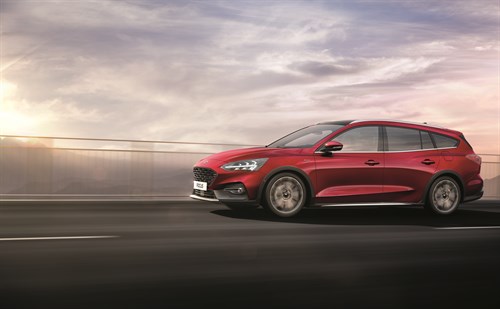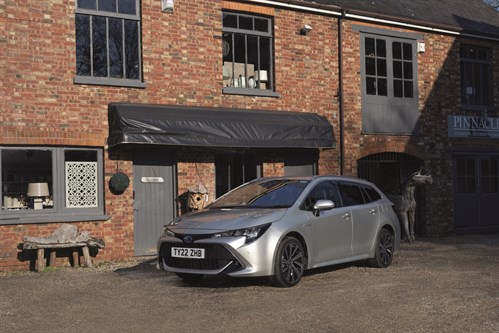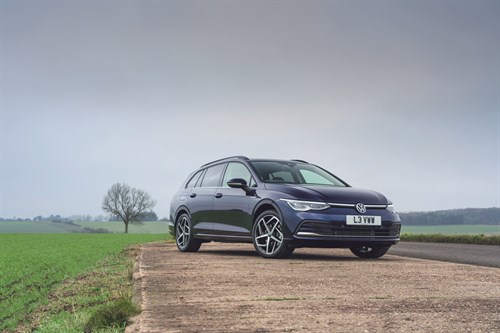We use cookies to ensure that we give you the best experience on our website. If you continue without changing your settings, we will assume that you are happy to receive all cookies on the Business Car website. However, if you would like to, you can change your cookies at any time

The start point for the best source of fleet information |
Best in Class: Lower-medium estates
Date: 09 August 2022 | Author: Martyn Collins

Peugeot 308
Despite the Stellantis empire equalling so many companies under one umbrella - with many of those producing rivals to the 308, Peugeot's latest design direction has resulted in some distinctive but attractive models - you only have to look at the 208, 2008 and 508 for example. Stellantis seem to have predicted the mood of the market well too. Like its other brands, Peugeot are offering petrol hybrid and full EV versions of these models, on top of ICE diesel and petrol power.
For the 308, two body styles are available - the hatchback and the SW estate that we're focussing on here. This Peugeot is offered with a choice of petrol, diesel, and of most interest to fleet, 180 and 225hp versions of the plug-in hybrid 1.6. Although it's the 180hp version we're covering here. But is it good enough to take best-in-class honours against more established rivals? Let's find out.
We've already briefly touched on this Peugeot's styling, but it's so distinctive that it's worth further mention, as the 308 is the most extreme execution of the current family style yet. At the front, the nose is quite upright, and dominated by the latest version of the family grille. Other identifiers are the vertical driving lights and heavily sculptured bonnet. At the side, the distinctive cut-outs over the arches are the highlights. The rear, like the front is quite upright in design, with the high-set lights spread across the rear of this car.
Inside, Peugeot's controversial i-cockpit is fitted. Like before, this means a tiny two-spoke steering wheel and tall dashboard. The idea is that drivers look over the top of the steering wheel at the digital instruments, but despite being the best execution yet, it still won't suit all. Other interior features include the latest infotainment and navigation systems, which are a real step forward with the shortcuts at the bottom. Peugeot see Volkswagen as a key rival, and the trim and materials inside certainly feel more upmarket than the similar but yet to be launched Vauxhall Astra. Average rear space is the only disappointment of the 308 SW's interior; even the 548-litre boot is practical and unaffected by the hybrid kit.
The Peugeot's 8% BIK figure looks particularly impressive here, especially as the joint next best are the Ford and Toyota at 29%. With the Volkswagen coming last with a 31% figure. It is no surprise then that Peugeot comes top for Benefit in Kind (BIK). The same goes for the emissions, as the Peugeot's 25g/km figure seems scarcely believable against the next best Toyota Corolla with its 121g/km figure. The Ford isn't far behind with its mild-hybrid power and 122g/km emissions, with the Volkswagen again coming last with its 132g/km figure.
This 308 SW's combined 180hp from its 1.6-litre petrol engine and 81kW electric motor is even more impressive when you look at the Peugeot's consumption figure of 281.1mpg. We doubt we'd be able to achieve this figure in everyday use, but it's still well ahead of the Ford and Toyota that are in second and third place, with their 53.3 and 52.3mpg figures - so it's a clean sweep for the Peugeot 308 so far.
Peugeot have done a lot of work in recent years on their residual values, so it's a shame this 308 can only manage third place here with its 35.90% figure. Although this isn't far behind the winning Toyota at 40.94% and the Volkswagen Golf with its 39.84% figure. Still, the 308 is close to the top of the residuals class and we're sure Peugeot will be happy with that.
With its standout numbers for the BiK figure, emissions and consumption, the Peugeot 308 SW in 180 PHEV form not unexpectedly finishes in first place in terms of its cost per mile figure.
Peugeot 308 SW 1.6 PHEV 180 Allure Premium
P11D: £35,715
CO2 (tax): 25g/km (8%)
BIK 20/40% a month: £45/£90
Fuel consumption: 281.1mpg
National Insurance: £1,290
First year VED: £0
Subsequent VED: £155
Engine size/power: 1,598cc+81kW electric motor/180hp
AFR: 14p
Residual value: 35.90%
Depreciation: £22,894
Fuel costs: £1,769
SMR: £1,877
Cost per mile: 44.23p

Ford Focus
A constant at the top of the UK sales charts, the fourth-generation Ford Focus received its mid-life facelift last year to keep it competitive against the key rivals we have here. The exterior has received the biggest changes, with a new grille and headlights at the front. At the side there are updated alloy wheel designs, while like the front, the back has new rear lights. Inside, the biggest change is the 13.2in infotainment display, which runs the Sync 4 software and is surprisingly easy to use.
In the range-topping Titanium Vignale equipment grade we have here, you'll not want for standard kit either, with features including leather trim, 10-speaker B&O sound system and a 12.3in digital cluster for the instruments.
Under the bonnet, this Focus's 1.0-litre, 153hp petrol now has added 48-volt mild hybrid technology and is the most powerful. Despite the hybrid assistance, this Focus only produces 153hp and a 60.1mpg consumption figure.
Being an MHEV rather than a full hybrid doesn't help the Focus, as it still has a 29% BiK figure and 53.3mpg consumption, which is a long way behind the Peugeot, but is close to the other MHEV, (the Volkswagen), and full hybrid, the Toyota. However, in terms of cost per mile, it is just pipped to third place by the Toyota.
Ford Focus 1.0T EcoBoost MHEV 155 Titanium Vignale Estate
P11D: £30,435
CO2 (tax): 122g/km (29%)
BIK 20/40% a month: £147/£294
Fuel consumption: 53.3mpg
National Insurance: £3,985
First year VED: £180
Subsequent VED: £155
Engine size/power: 998cc/153hp
AFR: 14p
Residual value: 35.82%
Depreciation: £19,534
Fuel costs: £9,330
SMR: £1.946
Cost per mile: 51.35p

Toyota Corolla
Toyota has been refining petrol hybrid technology since the launch of the original Prius in the UK at the end of the year 2000. Now most of Toyota's range is hybridised, just like the current Corolla. With the estate version of Toyota's C-Segment challenger seeming to fill the void for buyers where electrification doesn't work, and standard petrol engines are not frugal enough.
The 12th generation Corolla Touring Sports has lots to attract fleet buyers other than how frugal it is. It looks sharp, drives well with a refined ride and the interior is more spacious than the hatch and the 581 litre boot is practically shaped.
Design is the mid-level trim for the Corolla Touring Sports, it has most of the standard kit you'd ever need for a car at this price level, including 17in alloy wheels, 8in touchscreen display and dual-zone automatic air conditioning, and heated and ventilated front seats.
The Corolla is the oldest model in this group being launched in 2018, but Toyota's clever self-charging hybrid technology, means it is still competitive. It takes joint second place for BIK with the Ford at 29%, finishes in second place for emissions, with a 121g/km figure and finishes in third place for consumption just behind the Ford at 52,3mpg. Yet, because it has the best residual figure (40.94%) and lowest depreciation (£18,709), it claims second place in this group.
Toyota Corolla Touring Sports 2.0 VVT-h Design
P11D: £31,680
CO2 (tax): 121g/km (29%)
BIK 20/40% a month: £153/£306
Fuel consumption: 52.3mpg
National Insurance: £4,148
First year VED: £190
Subsequent VED: £155
Engine size/power: 1,987cc/184hp
AFR: 17p
Residual value: 40.94%
Depreciation: £18,709
Fuel costs: £9,506
SMR: £1,803
Cost per mile: 50.0p

Volkswagen Golf
The current, eighth-generation Golf might have been overshadowed by the release of Volkswagen's all-electric ID models. But this iconic range is the one Peugeot benchmarked the latest 308 against and it still has plenty to offer fleet buyers - especially in eTSi estate form.
The latest eighth-generation carries on with the same attractive mix an impressively refined ride, decent driving dynamics and impressive practicality - all with added technology. In fact, in estate form, there's the added room in the impressively spacious 605 litre boot. It looks the part in R-Line equipment grade too, with the standard 17in wheels, lowered sports suspension, plus unique bumpers, and side skirts. The sporty theme carries on inside, with front sports seat with height and lumbar adjustment.
Considering this car and the Ford are mild hybrids, the Volkswagen is the most disappointing performer. This Golf has the highest BIK at 31%, the highest consumption at 48.7mpg, and the highest emissions at 132g/km.
Although we've no doubt a lesser specification estate would perform better, we chose the R-Line to compete with the 308 SW on price. So, it's a shame that this Golf finishes in last position here. However, that Volkswagen badge still carries weight when it comes to resale. As such, this Golf finishes in second place behind the Toyota for residual values (39.84%) and depreciation (£19,228).
Volkswagen Golf 1.5eTSi MHEV 150 R-Line
P11D: £31,960
CO2 (tax): 132g/km (31%)
BIK 20/40% a month: £165/£330
Fuel consumption: 48.7mpg
National Insurance: £4,473
First year VED: £220
Subsequent VED: £155
Engine size/power: 1,498cc/150hp
AFR: 17p
Residual value: 39.84%
Depreciation: £19,228
Fuel costs: £10,211
SMR: £1,953
Cost per mile: 52.32p











